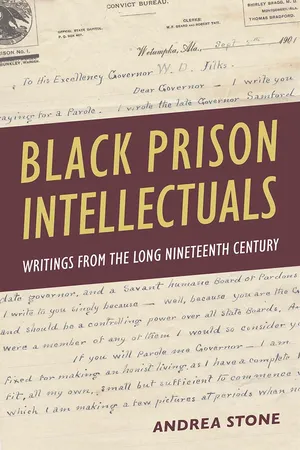
- English
- ePUB (mobile friendly)
- Available on iOS & Android
About this book
How early Black prison writing shaped Black intellectual movements
In
this book, Andrea Stone recovers critical, understudied writings from
early archives to call into question the idea that the Black prison
intellectual movement began in the twentieth century. In fact, nearly
two centuries before Angela Davis and Eldridge Cleaver, Black prisoners
were serving as thought leaders and contributing to political movements.
By illuminating their pathbreaking voices, Stone shows that prison
writing from this era was a foundational part of Black American
intellectualism.
Grounding her work in a history of the disproportionately high incarceration of Black Americans, Stone traces the arc of Black prison writing from 1795 to 1901. She analyzes gallows literature, court records, newspaper coverage, and parole request letters, arguing that parole requests represent an undervalued, vital literary genre. Most of the writers featured in this book were effectively treated as enemies of the state, leading Stone to a question that continues to resonate in America today: what is the distinction between criminal and enemy, and how are those categories intertwined with Blackness in the United States?
Black Prison Intellectuals sheds light on the roots of issues like structural racism and mass incarceration. Looking at an important literary tradition that contributed to the Black American intellectual movement, this book helps readers better understand the present as a moment in the long journey toward a racially just society.
Publication of this work made possible by a Sustaining the Humanities through the American Rescue Plan grant from the National Endowment for the Humanities.
Frequently asked questions
- Essential is ideal for learners and professionals who enjoy exploring a wide range of subjects. Access the Essential Library with 800,000+ trusted titles and best-sellers across business, personal growth, and the humanities. Includes unlimited reading time and Standard Read Aloud voice.
- Complete: Perfect for advanced learners and researchers needing full, unrestricted access. Unlock 1.4M+ books across hundreds of subjects, including academic and specialized titles. The Complete Plan also includes advanced features like Premium Read Aloud and Research Assistant.
Please note we cannot support devices running on iOS 13 and Android 7 or earlier. Learn more about using the app.
Information
Table of contents
- Cover
- Title Page
- Copyright Page
- Dedication
- Contents
- List of Figures
- Acknowledgments
- Introduction: Rethinking Outside and Inside through the Early Black Prison Intellectual
- 1. Gallows Death and Political Critique: Abraham Johnstone’s Address, Dying Confession, and Letter to His Wife (1797)
- 2. Lunacy and Liberation, Black Crime and Disability: Antislavery Argument in the Dying Confession of Pomp (1795)
- 3. Nineteenth-Century Counter/Terrorism: Black Prison Intellectual Nathaniel Turner’s Confessions and the Southampton Revolt (1831)
- 4. Nearly Six Months Imprisoned: Celia’s Textual and Embodied Intellectualism in Missouri’s Callaway County Jail (1855)
- Interlude: Postemancipation Criminality and Enmity in the Christian Recorder (1861–1901)
- 5. Dear Governor: The Parole Request as Literary Genre in James Foster’s Letters (1901)
- Conclusion: Early Black Prison Intellectual Legacies
- Notes
- Works Cited
- Index